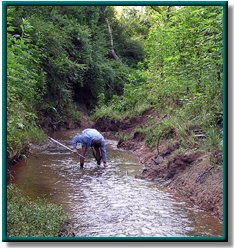Clear Creek: Volatile Organic Compounds
Counties: Brazoria, Fort Bend, Galveston, and Harris
Parameter: Volatile organic compounds
River Basin: San Jacinto–Brazos Coastal Basin
Segments: 1101, 1102
On this page:
- Background and Goals
- Description of Watershed
- Approved I-Plan
- Adopted TMDLs
- Status and Implementation
- Contact Us
Background and Goals
In 1993, the Texas Department of State Health Services (DSHS; then known as TDH) issued a fish-consumption advisory for portions of Clear Creek due to elevated concentrations in fish tissue of the pesticide chlordane and of volatile organic compounds (VOCs). Because chlordane is a legacy pollutant—a chemical that has been banned or severely restricted, but which still remains in the environment—no significant new sources are expected to occur. The goal of this TMDL project is to reduce contaminant concentrations in fish tissue to levels that constitute an acceptable risk to consumers.
Description of Watershed
The Clear Creek watershed drains parts of Fort Bend, Harris, Brazoria, and Galveston Counties. Segment 1102 (Clear Creek Above Tidal) extends from Rouen Road in Fort Bend County to a point 100 meters upstream of FM 528 in Galveston/Harris County, where it meets segment 1101. The fish consumption advisory applies to the entire 47-kilometer length of segment 1102. Segment 1101 (Clear Creek Tidal) extends downstream from 100 meters upstream of FM 528 to its confluence with Clear Lake 2 miles downstream of El Camino Real in Galveston/Harris County. The fish consumption advisory applies to the upper 15 kilometers of Segment 1101, to State Highway 3 in Webster.
Status and Implementation
The consumption ban was rescinded in October 2001; the fish consumption use is no longer identified as impaired for chlordane. The DSHS assessment that resulted in a lifting of the consumption ban found that chlordane concentrations were actually higher in the fish tissue samples than they were in the previous assessment. However, the DSHS evaluates health risk based on the cumulative effect of all compounds detected. This value has been reduced to acceptable levels because the concentrations of the other legacy pollutants have declined.
In 2007, the TCEQ funded an assessment by DSHS of fish captured from the creek that verified that chlordane levels in fish remain at acceptable levels. Information on fish tissue advisories and bans in Texas can be found on the DSHS website.
Approved I-Plan
The commission approved the implementation plan (I-Plan) on Oct. 12, 2001.
Adopted TMDLs
These total maximum daily loads (TMDLs) were first adopted by the commission on Feb. 9, 2001. On June 14, 2002, they were revised to include minor clarifying language and adopted by the commission. EPA approved the TMDLs on May 9, 2003, at which time they became part of the state’s Water Quality Management Plan.
-
Four TMDLs for Volatile Organic Compounds in Clear Creek
Segments 1101 and 1102 - Response to Public Comment on the Clear Creek VOC TMDLs
Contact Us
For further information regarding this project, please email tmdl@tceq.texas.gov and mention the Clear Creek VOCs project in the subject line. Or call us at 512-239-6682.





 Back to top
Back to top